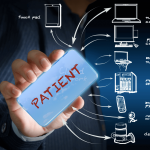 As countries around the world have attempted to roll out contact tracing applications, the issue of privacy of health data has reared its head again. Previous research has suggested that people are generally okay with sharing their medical data providing its put to a use that benefits society.
As countries around the world have attempted to roll out contact tracing applications, the issue of privacy of health data has reared its head again. Previous research has suggested that people are generally okay with sharing their medical data providing its put to a use that benefits society.
New research from the University of Warwick explored how patients with diabetes feel about their data being shared. With 4.7 million people living with diabetes in the UK, the researchers wanted to understand how data can be shared between the various specialists, and indeed the various applications, that are involved in the care of each person.
Data sharing is currently done via one practice requesting the medical data from another practice. It involves consent from the doctors involved, which can make it a lengthy process. It can also be difficult for patients to keep on top of, and they can easily feel they lack control over their own data.
Smart consent
The researchers devised a system, called Dovetail Digital, which provides a blockchain-based method of managing digital consent. They believe the system provides a robust and trusted mechanism for patients to give their consent to data sharing. It also allows them to revoke their consent at any time. It uses a mobile application to highlight where the individual’s data is being used at any particular time.
Dovetail was tested on 23 patients and 13 staff at a GP practice, all of whom have diabetes. They each completed a questionnaire, followed by a focus group discussion. The aim was to delve into their understanding of data, how its shared, and their thoughts around consent. A thematic analysis of the transcripts from the focus groups and a descriptive analysis of the questionnaire results were performed.
“We discovered there was a lack of understanding of existing consent processes in place, in fact many patients did not have any recollection of having previously given consent to their data being shared,” the researchers say. “When we asked them what they thought about the digital consent application patients overwhelmingly favoured the digital consent application over existing practice, as they recognised the value of the capability offered by the application.”
The participants in the study seemed to welcome an application that both improved the quality of their care, while also maintaining their control over their data. This includes clarity surrounding the consent application, and an ease of review (and revoking) of that consent.
“This was a very promising study on a technology that may be opening the way for highly innovative applications improving quality and efficiency of healthcare services, which patients would welcome, assured that ultimately they are in charge of their data,” the researchers conclude.